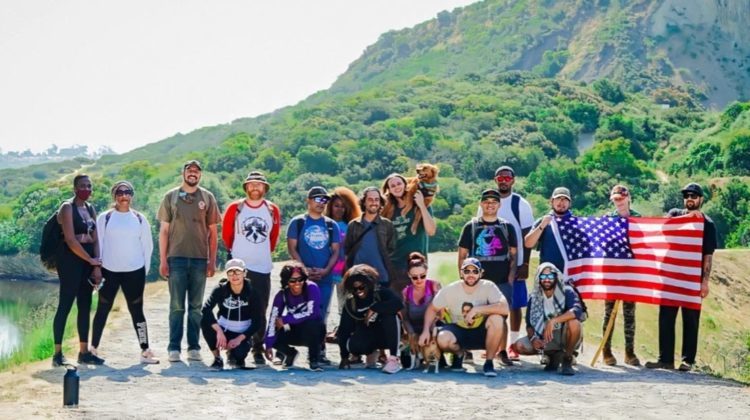
Veterans Walk and Talk members during group excursion. Photo credit: Veterans Walk the Talk.
One group is on a mission to help fellow veterans heal through plant medicine and outdoor activities.
Veterans Walk and Talk (VWAT) is a community group based in California that advocates for peer-therapy, hiking, and cannabis and psychedelic use for veterans as a way to help them alleviate many of the struggles they continue to face.
The group’s goal is to cultivate a community for veterans who have similar experiences. Additionally, its members provide opportunities to try plant medicine in a healthy, supportive and safe environment that promotes healing.
Veterans Walk and Talk
VWAT aims to create a safe space for veterans to express their struggles, such as adjusting to life after the military. Toegther, the group also aims to curb the suicide epidemic among veterans.
Colin Wells, a veteran and advocate of cannabis use, founded the group in 2016. Wells tells Emerald that he started the organization by posting on social media when he was going hiking, and asking if anyone wanted to join him. He also offered to provide free cannabis to anyone who wanted to try it and help educate others about its potential benefits.

Currently, the organization has 12 chapters across the U.S. Altogether, there are currently over 600 members in the San Diego area, roughly 150 members in Sacramento, and 200-250 in the Bay Area, Wells explains.
According to Wells, there are usually nine group hikes per month all across California. During these excursions, members are allowed to try cannabis and psychedelics, which are provided by donors and home growers such as the Veterans Cannabis Coalition.
With cannabis use becoming less stigmatized in recent years, more veterans have reported using cannabis to treat symptoms of chronic pain and mood disorders, like post-traumatic stress disorder (PTSD). Many users have expressed how cannabis is more effective compared to the traditional pharmaceutical drugs that doctors often prescribe to veterans.
In fact, there are several clinical trials in the U.S., Australia and beyond that highlight cannabis’ efficacy in treating symptoms of PTSD — like depression and anxiety — in veterans.
The Inspiration Behind the Organization

For Wells, cannabis helps treat PTSD and addiction he experienced after leaving the military.
Wells served in the U.S. Army Infantry from 2008-2012 and was deployed in Afghanistan. After exiting the infantry, he suffered from PTSD and struggled to adjust to life after the military.
He tried many different forms of medications, but none of them worked. Eventually, he developed a heroin addiction. After beginning to use cannabis, Wells was able to become opioid-free.
Wells is not alone. In fact, one study conducted by the Recovery Research Institute shows that compounds in cannabis, particularly CBD, reduces drug craving and anxiety in those recovering from opioid addiction. The study found that the patients who received doses of CBD medication showed reduced cravings compared to the patients who received the placebo.
Research has also shown that the use of psychedelic therapy helps PTSD sufferers alleviate their symptoms. Psychedelic therapy uses substances, such as LSD and psilocybin, that can induce hallucinations to treat mental illness. According to Medical News Today, psychedelics may alter the brain’s neurotransmitter levels, which can make people more responsive and likely to engage in therapy.
Wells now looks to help other veterans by creating a safe environment for them to try cannabis and psychedelics.
“Cannabis and psychedelics are used as a catalyst to help veterans open up about themselves,” Wells shared. “Cannabis [specifically] helps with pain relief, so when our pain is relieved, we are able to open up our hearts.”
Post from @veteranswalkandtalk on Instagram.
One Veteran Shares His Story and Journey With VWAT
Post from @veteranswalkandtalk on Instagram.
Like Wells, Danny Rasmussen also benefits from VWAT’s support, and access to plant medicines in addition to the group’s activities.
Rasmussen is a veteran who served in the U.S. Navy from 2004-2007. Rasmussen’s experience in the Navy left him with PTSD.
“After the Navy, I struggled with readjustment. I felt disconnected from my life in the military even though I did not want to go back. But I could not relate with people who had not served. My purpose, my sense of community, the responsibility was all gone and I felt lost,” Rasmussen explained.
He told Emerald that he met Wells one day when he was hiking in the hills of Los Angeles. Since then, Rasmussen has become an important part of VWAT, and now is the leader of the Pomona chapter.
Rasmussen is just one example of the many people that VWAT has helped by creating an environment that emphasizes that healing is a process that can be accomplished through community support and the use of plant medicine.
“I didn’t know it, but I was trying to find my tribe,” he shared. “I didn’t realize it until I drove out to a hike in the hills of Los Angeles and met a red-bearded vet named Colin Wells. Colin was living out of his van at the time, but he made it his mission to help other struggling veterans. [We] would facilitate hikes and even pick up veterans who couldn’t drive.”
Rasmussen reflected, “I knew immediately that I had found a brother and a new purpose.”



Leave a Reply